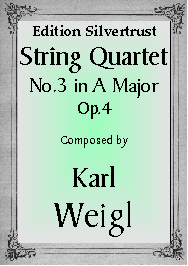Presents
Karl Weigl
String Quartet No.3 in A Major, Op.4
 In 1910,
the String Quartet No.3 in A Major, Op.4 by Karl Weigl won the prestigious
Beethoven Prize. This was no accident. His music was championed by the likes of
Gustav Mahler, Richard Strauss, Bruno Walter and many others. Weigl, up until
the Second World War, was recognized as one of the most important living
composers.
In 1910,
the String Quartet No.3 in A Major, Op.4 by Karl Weigl won the prestigious
Beethoven Prize. This was no accident. His music was championed by the likes of
Gustav Mahler, Richard Strauss, Bruno Walter and many others. Weigl, up until
the Second World War, was recognized as one of the most important living
composers.
“Karl Weigl’s music will not be lost. We will return to it after the storm has passed. We will return to those who have written real music.”--Pablo Casals.
To this Arnold Schönberg, writing in 1938, added, “I always considered Karl Weigl as one of the best composers of the old school; one of those who continued the glittering Viennese tradition. He truly preserves this old culture of musical spirit which represents the best of Viennese culture.
Yet, despite the high regard of his contemporaries, Weigl immediately plunged into obscurity barely able to make ends meet when, in 1938, he fled his native Austria and emigrated to the United States. Eventually, he secured a teaching post at the Hart School of Music and later served as head of the theory department at the New England Conservatory. In no small part, the Second World War permanently swept away what had, up until then, been a prominent European, if not international, reputation. In the German-speaking world, his compositions were amongst the most performed of all 20th century composers.
Karl Weigl (1881-1949) was educated at the University of Vienna and the Conservatory of the Gesellschaft der Musikfreunde. He also studied with Alexander Zemlinsky, who was a family friend. Although he never abandoned writing tonal compositions and did not believe in the twelve tone system, Weigl nevertheless became friends with both Webern and Schönberg. In 1903, the three of them founded the Vereingung schaffender Tonkünstler which dedicated itself to presenting concerts of important modern works including those of Mahler, Richard Strauss, Reger, Pfitzner, Schönberg, Zemlinsky and Weigl. Mahler, when director of the Vienna Court Opera, engaged Weigl as his rehearsal conductor. There, he coached such legendary singers as Leo Slezak, Lotte Lehmann and Selma Kurtz. Throughout this period up until the outbreak of WWI, Weigl worked diligently composing works in many genres.
The opus number of Weigl's compositions are fairly meaningless. His String Quartet No.1 carries the number Op.20 but was definitely written before the String Quartet No.3. The Third Quartet, while expanding the tonalities of the late Romantic style, never breaks the bounds of tonality. The opening movement, Innig bewegt (intimate with movement), tonally bears a resemblance to Hugo Wolf's Italian Serenade. Sweet, lilting Viennese melody is mixed with unusual rhythmic cadences. The rhythmically potent second movement, Kraftig bewegt (powerful with movement), serves as the scherzo. Energetic and thrusting, the music is quite original and certainly seizes and holds one's attention. Sehr langsam (very slow), is introspective and melancholy but not tragic. Here, Weigl takes Bruckner's tonalities as his starting point. In the extraordinarily powerful finale, Stürmisch (stormy), Weigl takes the opening notes to the final movement of Beethoven's 9th Symphony as his motif and main theme and turns them into a remarkable adventure.
We believe this is one of the most significant and important string quartets of the 20th century. It has been out of print for many years and we hope that by making it available once again, that professionals will add it to their repertoire and bring it back into the concert hall where it belongs. As for amateurs, it is well within scope of the experienced and technically competent players.
Parts: $24.95
Parts & Score: $31.95